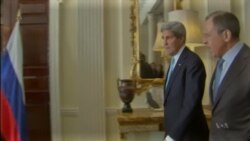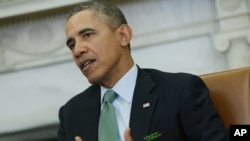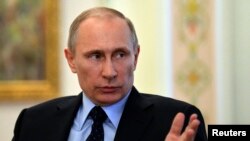LONDON —
U.S. Secretary of State John Kerry says Russian acceptance of a Crimean referendum to break off from Ukraine and possibly join Russia would be an illegal "backdoor annexation."
Kerry met with Russian Foreign Minister Sergei Lavrov for six hours in London Friday in another effort to defuse the tensions in Crimea.
Kerry called talks Friday with Russian Foreign Minister Sergei Lavrov "constructive and frank" but said that Russia is not prepared to make any decisions on Ukraine until after a referendum in Crimea set for Sunday.
Kerry said the U.S. continues to favor a direct dialogue with Russia and Ukraine. He added that the U.S. does not recognize the legality of a referendum that could see Crimea break away from Ukraine and join Russia.
Kerry said Lavrov made clear that Russian President Vladimir Putin is not prepared to act regarding Ukraine until after the referendum.
Lavrov said in a separate news conference that the talks with Kerry were useful, but the two have "no common vision" on Crimea. He said Russia will "respect the will of the Crimean people," and he criticized the threat of U.S. and EU sanctions on Russia as "counterproductive."
Kerry told reporters in London that there will be an even greater response if Russia further increases tensions in Ukraine.
"There will be consequences if Russia does not find a way to change course," he said. "And we don't say that as a threat. We say that as a direct consequence of the choices that Russia may or may not choose to make here."
The White House said later Friday afternoon that it is "regrettable" that Russia has chosen not to deescalate tensions and warned it will respond "quickly" if Sunday's referendum moves ahead.
Reuters news agency reported late Friday that a draft U.N. security council resolution due to be voted on Saturday declares that Sunday's referendum on the status of Crimea "can have no validity." The resolution, drafted by the U.S., says the referendum was not backed by Ukraine's government. Reuters quotes Russia's Deputy Foreign Minister, Gennady Gatilov as saying the resolution is "unacceptable," a sure sign of a Russian veto.
Speaking to reporters in Washington after the London talks, U.S. President Barack Obama said he remains optimistic for continued dialogue with Russia.
"We continue to hope that there is a diplomatic solution to be found,'' Obama said. "But the United States and Europe stands united, not only in its message about the Ukrainian sovereignty but also that there will be consequences if, in fact, that sovereignty continues to be violated.'
U.S. and European leaders have called the Russia-backed referendum "unconstitutional," and Kerry has warned Moscow of serious consequences if it annexes the Ukrainian peninsula.
NATO Secretary-General Anders Fogh Rasmussen said Friday that the referendum lacks legitimacy.
"The so-called referendum ... would be a direct violation of the Ukrainian constitution and international law," he said in a statement. "If held, it would have no legal effect or political legitimacy.'
Self-determination
But Russian officials say voters in Crimea have a right to self-determination following last month's collapse of the pro-Russian government in Ukraine
Russian President Putin on Friday rejected Western accusations that a Crimea referendum would be illegal.
In a telephone conversation with U.N. Secretary Ban Ki-moon, Putin "underscored that the decision to conduct [the referendum] fully corresponds to the norms of international law and the U.N. Charter'', the Kremlin said.
Adding to those tensions are thousands more Russian troops near the Ukrainian border for maneuvers that Moscow says will continue for two weeks.
"We also remain deeply concerned about the large deployments of Russian forces in Crimea and along the eastern border with Russia as well as the continuing provocations and some of the hooliganism of young people who have been attracted to cross the border and come into the east," Kerry said.
But Lavrov said those troops are no threat to anyone. He said the Russian Federation does not and cannot have any plans to invade the southeastern regions of Ukraine.
He added that Moscow's position is that the rights of Russians, the rights of Hungarians, the rights of Bulgarians as well as the rights of Ukrainians themselves should be insured and protected.
A senior State Department official says Lavrov assured Kerry that those new Russian troops will not enter Ukraine.
The foreign minister made similar assurances before Russian troops crossed the border following the collapse of the pro-Russian government in Kyiv.
As for sanctions, that is up to Western countries that Lavrov said realize how counter-productive they would be. He said it is obvious that sanctions would not benefit the mutual business interests of Russia and its trading partners.
Much of Europe's natural gas comes from Russia through pipelines across Ukraine.
Reuters contributed to this report.
Kerry met with Russian Foreign Minister Sergei Lavrov for six hours in London Friday in another effort to defuse the tensions in Crimea.
Kerry called talks Friday with Russian Foreign Minister Sergei Lavrov "constructive and frank" but said that Russia is not prepared to make any decisions on Ukraine until after a referendum in Crimea set for Sunday.
Kerry said the U.S. continues to favor a direct dialogue with Russia and Ukraine. He added that the U.S. does not recognize the legality of a referendum that could see Crimea break away from Ukraine and join Russia.
Kerry said Lavrov made clear that Russian President Vladimir Putin is not prepared to act regarding Ukraine until after the referendum.
Lavrov said in a separate news conference that the talks with Kerry were useful, but the two have "no common vision" on Crimea. He said Russia will "respect the will of the Crimean people," and he criticized the threat of U.S. and EU sanctions on Russia as "counterproductive."
Kerry told reporters in London that there will be an even greater response if Russia further increases tensions in Ukraine.
"There will be consequences if Russia does not find a way to change course," he said. "And we don't say that as a threat. We say that as a direct consequence of the choices that Russia may or may not choose to make here."
The White House said later Friday afternoon that it is "regrettable" that Russia has chosen not to deescalate tensions and warned it will respond "quickly" if Sunday's referendum moves ahead.
Reuters news agency reported late Friday that a draft U.N. security council resolution due to be voted on Saturday declares that Sunday's referendum on the status of Crimea "can have no validity." The resolution, drafted by the U.S., says the referendum was not backed by Ukraine's government. Reuters quotes Russia's Deputy Foreign Minister, Gennady Gatilov as saying the resolution is "unacceptable," a sure sign of a Russian veto.
Speaking to reporters in Washington after the London talks, U.S. President Barack Obama said he remains optimistic for continued dialogue with Russia.
"We continue to hope that there is a diplomatic solution to be found,'' Obama said. "But the United States and Europe stands united, not only in its message about the Ukrainian sovereignty but also that there will be consequences if, in fact, that sovereignty continues to be violated.'
U.S. and European leaders have called the Russia-backed referendum "unconstitutional," and Kerry has warned Moscow of serious consequences if it annexes the Ukrainian peninsula.
NATO Secretary-General Anders Fogh Rasmussen said Friday that the referendum lacks legitimacy.
"The so-called referendum ... would be a direct violation of the Ukrainian constitution and international law," he said in a statement. "If held, it would have no legal effect or political legitimacy.'
Self-determination
But Russian officials say voters in Crimea have a right to self-determination following last month's collapse of the pro-Russian government in Ukraine
Russian President Putin on Friday rejected Western accusations that a Crimea referendum would be illegal.
In a telephone conversation with U.N. Secretary Ban Ki-moon, Putin "underscored that the decision to conduct [the referendum] fully corresponds to the norms of international law and the U.N. Charter'', the Kremlin said.
Adding to those tensions are thousands more Russian troops near the Ukrainian border for maneuvers that Moscow says will continue for two weeks.
"We also remain deeply concerned about the large deployments of Russian forces in Crimea and along the eastern border with Russia as well as the continuing provocations and some of the hooliganism of young people who have been attracted to cross the border and come into the east," Kerry said.
But Lavrov said those troops are no threat to anyone. He said the Russian Federation does not and cannot have any plans to invade the southeastern regions of Ukraine.
He added that Moscow's position is that the rights of Russians, the rights of Hungarians, the rights of Bulgarians as well as the rights of Ukrainians themselves should be insured and protected.
A senior State Department official says Lavrov assured Kerry that those new Russian troops will not enter Ukraine.
The foreign minister made similar assurances before Russian troops crossed the border following the collapse of the pro-Russian government in Kyiv.
As for sanctions, that is up to Western countries that Lavrov said realize how counter-productive they would be. He said it is obvious that sanctions would not benefit the mutual business interests of Russia and its trading partners.
Much of Europe's natural gas comes from Russia through pipelines across Ukraine.
Reuters contributed to this report.







